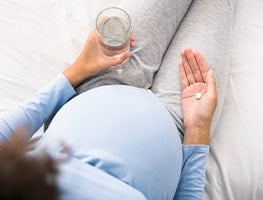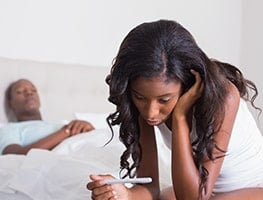What are my chances of getting pregnant in any given month?
For a healthy, fertile couple where both partners are under the age of 35, the chance of getting pregnant straight away is actually pretty low – it’s estimated at around 25 % per month, if you have regular unprotected sex around the time of ovulation.
If you’re not actively trying to conceive and not planning intercourse to occur around the time of conception, but you are having regular unprotected sex, your chances of getting pregnant are between 20-30% per month.
That’s why doctors have traditionally suggested waiting until you have been trying for a baby for a year before starting fertility investigations, although many couples choose to start preliminary investigations after six months, particularly if they are over thirty.
How do the chances of getting pregnant change as I get older?
On average, a woman with no fertility issues will fall pregnant after four months of trying to get pregnant – but from around the age of 27, fertility slowly declines with age until around 35, then declines faster until the age of 40, after which fertility decline is very rapid.
There is much debate between scientists about the odds of conception. However, they all agree that women in their 30s are 50% less likely to fall pregnant than women in their 20s. Female fertility starts to decline in their late 20s and substantially decreases by their late 30s.
An average 39-year-old woman has half the fertility she had when she was 31, and this halves again by the time she’s 42. One in every four women over the age of 35 have trouble falling pregnant. At age 30, the chance of conceiving per menstrual cycle is about 20%. At 40 it would go down to around 5%.
A 2002 study found that there was great variability in the chances of getting pregnant on the peak day of conception <link to C1.6_Best time to get pregnant> (two days before ovulation). They estimated that, for a couple who were the same age, the odds of falling pregnant in any one menstrual cycle when having sex on the peak day for conception were:
For age 19 to 26: 50% chance in any one menstrual cycle
For age 27 to 34: 40% chance in any one menstrual cycle
For age 35 to 39: less than 30% chance in any one menstrual cycle, but with a male partner five years older, the chance falls to less than 20% chance in any one menstrual cycle
This study also suggested that smoking, sexually transmitted disease history and occupational exposures contributed to lower fertility rates.
Can IVF improve fertility rates for older women?
Increased use of assisted conception treatments by older couples has helped promote the idea that fertility treatments like IVF can postpone the natural decline of fertility. This is not so. All it does is to help people, who are over 35 and have trouble falling pregnant, to conceive. IVF is a major treatment for infertility when other methods of assisted reproductive technology have failed. Success rates for IVF still mirror those of natural fertility.
A report by the US Centers for Disease Control and Prevention (CDC) and a paper published in South Africa in 2012, showed that the rate of live births from IVF and similar treatments using the mother’s own eggs decreases with age.
In vitro in Latin means “in glass”. In vitro fertilization (IVF) is a highly sophisticated and meticulously timed procedure. It involves the removal of an egg or eggs from the female’s ovary, fertilising it with semen, incubating these growing cells in a laboratory dish, and then replacing them back into the womb at the appropriate time.
The latest figures show that, for women under 35, the percentage of live births after one cycle of assisted reproductive treatments (including IVF) was about 45%.
Success rates declined after this age group. For those between ages 35-37 it was about 37%, dropping steadily to just 6.6% for those aged over 42.
But older women can dramatically raise their IVF success rates by using a donor egg; the CDC report states that the chance of a fertilised egg implanting depends on the age of the woman who produced the egg.
Success rates for women, even in their mid-forties, who use a donor egg from a woman in her 20s or early 30s remains above 40%.
Many women have no trouble falling pregnant over 35 or even over forty; but if you’re over 35 and haven’t fallen pregnant after six months, it’s worth talking to your doctor and starting fertility investigations.
What can be done to improve my odds?
Plenty of products, consultants and websites promise to improve your chances of getting pregnant – for a price. But many are rip-offs with no scientific evidence, which prey on the vulnerability of people keen to have a baby.
Here are some tips on improving your chances of getting pregnant without paying a fortune:
Reduce your stress levels
There’s a strong correlation between stress levels and fertility. If the main reason you’re stressed is that you want to have a baby, then this is hollow-sounding advice indeed. But there are often ways you can change other stresses in your life: take a holiday or re-think your job or other commitments that might shift down your priority list.
Aim for a healthy weight
Research shows that there is a strong connection between obesity in women and lower fertility. Being significantly underweight for long periods of time can also negatively impact your fertility. Try for a healthy balance!
Improve your diet
While research evidence is inconclusive, some fertility experts swear by a diet of organic foods. It’s your choice whether to go all-out or just keep an eye on your food choices (eating at home and avoiding take-aways is always a good start).
Quit smoking and cut back on the booze
There’s a strong link between smoking and reduced fertility in both men and women; this might be enough of an incentive to help you kick the habit.
Regular exercise
You don’t have to become a gym junkie – in fact, it’s better if you’re not – but some regular exercise each day can’t hurt; and if a nice long walk reduces your stress levels and improves your cardio status, it might well help your chances of getting pregnant.
























